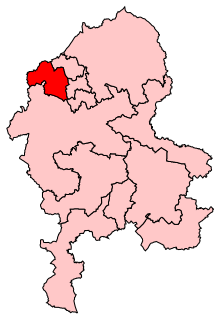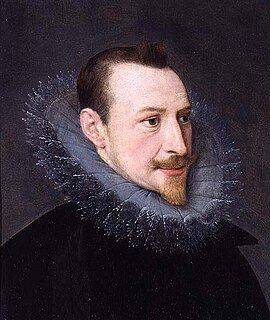
Edmund Spenser was an English poet best known for The Faerie Queene, an epic poem and fantastical allegory celebrating the Tudor dynasty and Elizabeth I. He is recognized as one of the premier craftsmen of nascent Modern English verse, and is often considered one of the greatest poets in the English language, though now known for his anti-Irish bigotry.
Spenser—his first name is never officially revealed—is a fictional character in a series of detective novels initially by the American mystery writer Robert B. Parker and later by Ace Atkins. He is also featured in a television series and a series of TV movies based on the novels.
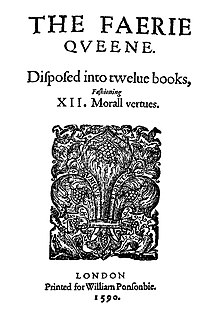
The Faerie Queene is an English epic poem by Edmund Spenser. Books I–III were first published in 1590, and then republished in 1596 together with books IV–VI. The Faerie Queene is notable for its form: it is one of the longest poems in the English language as well as the work in which Spenser invented the verse form known as the Spenserian stanza. On a literal level, the poem follows several knights as a means to examine different virtues, and though the text is primarily an allegorical work, it can be read on several levels of allegory, including as praise of Queen Elizabeth I. In Spenser's "Letter of the Authors", he states that the entire epic poem is "cloudily enwrapped in Allegorical devises", and the aim of publishing The Faerie Queene was to "fashion a gentleman or noble person in virtuous and gentle discipline".
The Spenserian stanza is a fixed verse form invented by Edmund Spenser for his epic poem The Faerie Queene (1590–96). Each stanza contains nine lines in total: eight lines in iambic pentameter followed by a single 'alexandrine' line in iambic hexameter. The rhyme scheme of these lines is ABABBCBCC.

Peter Gunning was an English Royalist church leader, Bishop of Chichester and Bishop of Ely.

Spenser: For Hire is an American crime drama series based on Robert B. Parker's Spenser novels. The series, developed for TV by John Wilder and starring Robert Urich, was broadcast on ABC from September 20, 1985 until May 7, 1988.

Robert Brown Parker was an American writer of fiction, primarily of the mystery/detective genre. His most famous works were the 40 novels written about the private detective Spenser. ABC television network developed the television series Spenser: For Hire based on the character in the mid-1980s; a series of TV movies based on the character were also produced. His works incorporate encyclopedic knowledge of the Boston metropolitan area. The Spenser novels have been cited by critics and bestselling authors such as Robert Crais, Harlan Coben, and Dennis Lehane as not only influencing their own work but reviving and changing the detective genre. Parker also wrote two other series based on an individual character: He wrote nine novels based on the character Jesse Stone and six novels based on the character Sunny Randall. Mr. Parker wrote four Westerns starring the duo Virgil Cole and Everett Hitch. The first, Appaloosa, was made into a film with Ed Harris.

The Shepheardes Calender was Edmund Spenser's first major poetic work, published in 1579. In emulation of Virgil's first work, the Eclogues, Spenser wrote this series of pastorals at the commencement of his career. However, Spenser's models were rather the Renaissance eclogues of Mantuanus. The title, like the entire work, is written using deliberately archaic spellings, in order to suggest a connection to medieval literature, and to Geoffrey Chaucer in particular.
The poem introduces Colin Clout, a folk character originated by John Skelton, and depicts his life as a shepherd through the twelve months of the year. The Calender encompasses considerable formal innovations, anticipating the even more virtuosic Countess of Pembroke's Arcadia, the classic pastoral romance by Sir Philip Sidney, with whom Spenser was acquainted. It is also remarkable for the extensive commentary included with the work in its first publication, ascribed to an "E.K." E.K. is an intelligent, very subtle, and often deeply ironic commentator, who is sometimes assumed to be an alias of Spenser himself. The term sarcasm is first recorded in English in Spenser's poem.
A Man Called Hawk is an American action drama series that ran on ABC from January 1989 until May 13, 1989. The series is a spin-off of the crime drama series Spenser: For Hire, and features the character Hawk, who first appeared in the 1976 novel Promised Land, the fourth in the series of Spenser novels by mystery writer Robert B. Parker.
Spenser is an alternative spelling of the British surname Spencer. It may refer to:

Pale Kings and Princes is a Spenser novel by Robert B. Parker. The title is taken from John Keats's poem La Belle Dame sans Merci: A Ballad. Following the murder of a reporter, Spenser is hired by a newspaper to investigate drug smuggling around the area of Wheaton, Massachusetts. There he encounters many troubles, including the death of a policeman and his son. Spenser, with the help of his friend, Hawk, eventually secures the downfall of the local cartel.
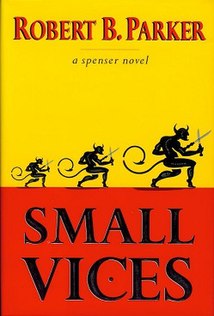
Small Vices is the 24th Spenser novel by Robert B. Parker.
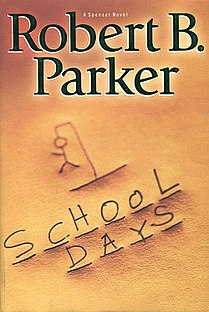
School Days (2005) is a work of detective fiction by American author Robert B. Parker, the 33rd in his acclaimed Spenser series.

SYR8: Andre Sider af Sonic Youth is a live album by Sonic Youth with Mats Gustafsson and Merzbow. It was the eighth release in the SYR series. It was released on July 28, 2008. The album was recorded on July 1, 2005 at the Roskilde Festival. The album title is in Danish and means "Other sides of Sonic Youth".

Early Autumn is a Spenser novel by Robert B. Parker. It is the seventh novel in the Spenser series.
John Young was an English academic and bishop.

The Judas Goat is the fifth Spenser novel by Robert B. Parker, first published in 1978.

Ceremony is the ninth Spenser novel by Robert B. Parker, first published in 1982. It is the first of three Spenser novels involving the character April Kyle, who returns in Taming a Sea-Horse and Hundred-Dollar Baby.
Jeremy Spenser is a British former actor who made his screen debut aged 11 in Anna Karenina (1948).
David Spenser was a Sri Lankan-born British actor, director, producer and writer. Spenser played the title role in a 1948 radio production of Richmal Crompton's Just William, and also appeared in popular films and TV series including Doctor Who. His documentary about Gwen Ffrangcon-Davies won an International Emmy Award. He was the elder brother of actor Jeremy Spenser.
